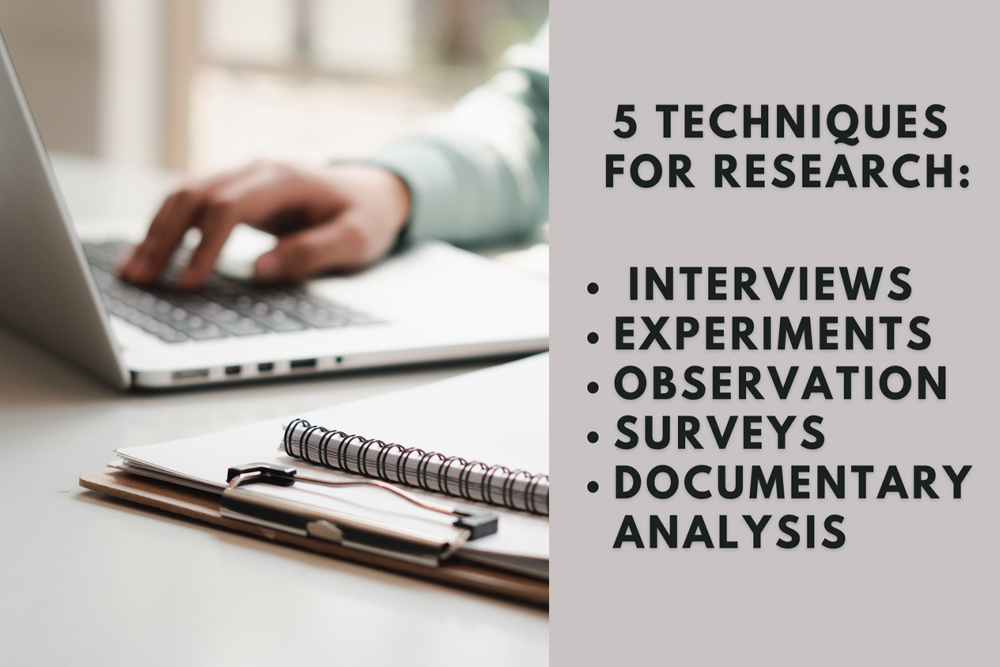Research is an integral part of completing an academic assignment, regardless of its type of complexity. As such, all students must develop this skill and learn how to use effective grades that help them produce commendable work that can stand up to scrutiny.

To that end, we are discussing the most commonly used research methodologies or techniques. There is a lot of information about this subject on the internet, but the books and guides all give different explanations and directions.
If this makes you feel intimidated, you can choose to engage with Studybay, an online assignment service where you can get cheap assistance from experts.
To save you time and effort, we’ve compiled a list of some of the best and most reliable research techniques that will help you complete all your academic assignments satisfactorily. But, before we dive into it, let’s first define what academic research entails.
What is Academic Research?
The Cambridge English Dictionary defines research as “a detailed study of a subject, especially to discover (new) information or reach a (new) understanding.”
Therefore, in this context, college students use academic research as a way of gaining a better understanding of a particular subject, acquiring new information, and gathering data for analysis and conclusions. This process not only enhances critical thinking skills but also fosters a deeper engagement with the subject matter. Academic research helps learners refine their ability to evaluate sources, synthesize information, and present well-supported arguments. For those navigating the demands of rigorous coursework, platform AssignmentBro at https://assignmentbro.com/ offer indispensable support, ensuring high-quality assistance with research and writing tasks. By utilizing such resources, college learners can better manage their time while maintaining a focus on comprehensive understanding and personal growth.
Research techniques, on the other hand, are methods, techniques, or processes used to collect data or find evidence for further analysis to provide a better understanding or present new information on a given topic. Research methods can be:
| Quantitative research | Collecting and analyzing numerical data |
| Qualitative research | Collecting and analyzing non-numerical data like interviews and observations |
| Empirical research | Based on direct experience or observation |
| Historical research | Analyzing past events and their impact |
Understanding the value you can derive from each of these approaches is important in determining what you apply to your research. It allows researchers to combine the best tools and techniques to surface insights and data.
5 Techniques for Research
Researchers deploy many techniques to add to their background research and give their conclusions solid footing.
With the digitization of research material and methodologies, researchers can use edtech tools to complete their work in record time and deliver high-quality results. For those needing additional support, there are many resources offering assignment help for students to enhance their research skills.
Here are the most fundamental techniques for academic assignment research:
- Interviews
Interviews are a qualitative technique, and you can use them to gather data from people’s personal life experiences. They are one-on-one sessions with questions and answers that are normally carried out in person.
It is still possible to carry them on the phone or online, depending on what is most convenient for the participants.
As the researcher, you’ll be required to come up with the interview questions. One great tip with this technique is to make sure that you have recorded, carefully transcribed, and edited the interviews so that you can use them later after your assignment as a data source for further analysis.
- Experiments
If you’re in a scientific field, you’re no stranger to experiments. They provide researchers with a systematic way to test hypotheses, prove theories, and collect data into causal relationships.
Experiments are effective since they offer benefits that include:
- A controlled environment. It allows us to isolate variables and ensure the experiment is replicable and thus verifiable by others.
- Causal inference. Experiments can show causality by manipulating variables to observe changes and test specific hypotheses to get evidence that refutes or supports theoretical predictions.
- Quantitative data. The goal of experiments is usually to collect data, giving you measurable outcomes to base your academic insights on. Results also reduce the reliance on subjectivity, ensuring results are interpreted without needless biases.
- Discovery. An experiment can deliver an innovation or discovery that explores new phenomena or develops new theories by exploring uncharted aspects of a discipline.
- Flexibility. Experiments are controlled and thus can be designed to fit the function, such as field experiments, quasi-experiments, lab environment experiments, and randomized controlled trials.
- Practical application. Experiments can inform decisions and practical applications by providing recommendations or guidance based on evidence. This is highly important in fields such as medicine, psychology, engineering, etc.
While experiments require being careful when designing them and considering multiple variables, they are a great way to gain clear and replicable insights, making them useful across many disciplines.
- Observation
Observation is one of the fundamental techniques applied by researchers everywhere. In this paradigm, you systematically watch, listen to, and record behaviors and events in their natural setting.
Here is why it is often used:
- Observation offers rich, contextual data where subjects are observed in a realistic and comprehensive environment.
- Researchers can collect detailed, qualitative data that captures the nuances and subtleties of interaction and behavior. It offers a deeper look into phenomena through the simultaneous observation of multiple aspects.
- Unlike interviews or surveys that rely on self-reported data, observation captured actual behavior, removing bias from the data.
- Observation methods are applicable in multiple contexts and disciplines, be it a classroom, natural environment, or community setting. They are a great way to identify patterns before formulating specific hypotheses for testing.
- In ethnographic research, observation is key to understanding social dynamics, beliefs, and cultural practices within a community. Researchers can immerse themselves in their setting for a deeper and insider perspective on the subject matter.
These are not, by any means, all the benefits you can enjoy. When searching for professionals who can ‘write my assignment,’ they will have more data to work with when compiling your findings in a paper.

4. Surveys
Surveys are so ubiquitous that there’s a chance you will do a few in your lifetime. They are effectively used in marketing, education, public health, social sciences, and more. They are an effective research technique for various reasons. Let’s talk about some of them:
- Surveys can reach a large and diverse pool of respondents, making it possible to generalize findings to a broad demographic. The data is also typically quantitative, which helps with statistical analysis and hypothesis testing.
- Surveys can be conducted through multiple formats, including paper forms, questionnaires, face-to-face interaction, and more.
- You can standardize questions to ensure all respondents get the same questions in the same way. Uniformity is crucial in eliminating interviewer bias and improving data reliability.
- The costs involved are also significantly lower than most other forms of research. In the modern world, digital surveys present a cheap and quick way to get data from a large number of respondents in a time-efficient manner.
- You can choose what to include in a survey to serve your specific research needs, including Likert scales, multiple-choice, open-ended questions, etc. The anonymity of surveys also encourages honest answers, especially on sensitive topics.
If you follow the best practices of survey design and consider ethical implications, this method can maximize the reliability and validity of your findings.
5. Documentary Analysis
This is a qualitative method of analysis that, as the name implies, involves going through documentary material such as journals, diaries, newspapers, letters, clippings, public records, videos, audio, etc.
The raw data offered by documentary analysis means you have a wide variety of sources, detailed and comprehensive information, an accessible means of gaining insights (especially given the digitization of such sources), a non-intrusive approach, and the room to conduct longitudinal analysis.
Suffice it to say that research, as a whole, is a multi-pronged approach that benefits from the use of diverse sources and the combination of methodologies. Learn what each one can benefit your purposes and leverage the best practices for useful results.


Trackbacks/Pingbacks